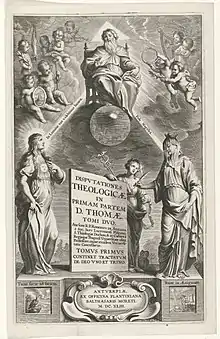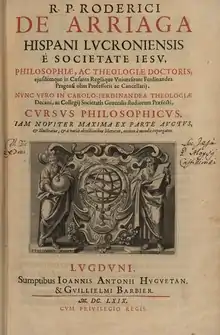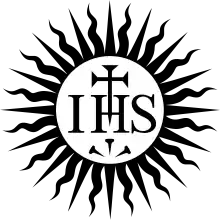Rodrigo de Arriaga
Rodrigo de Arriaga (17 January 1592 – 7 June 1667) was a Spanish philosopher, theologian and Jesuit.[2] He is known as one of the foremost Spanish Jesuits of his day and as a leading representative of post-Suárezian baroque Jesuit nominalism.
Rodrigo de Arriaga | |
|---|---|
 Disputationes theologicae, Antwerp, 1643 | |
| Born | 17 January 1592 |
| Died | 7 June 1667 (aged 75) |
| Era | 17th-century philosophy |
| Region | Western philosophy |
| School | Scholasticism Conceptualism[1] |
Influences
| |
Life
Born in 1592, at Logroño in Castile, he joined the Society of Jesus on September 17, 1606, when he was 14 years old.[3] He studied philosophy and theology under Pedro Hurtado de Mendoza.[4] He taught philosophy (1620–1623) and theology (1624) in Valladolid and theology in Salamanca (1624–1625).[5]
Having learned from the letters of the general of the order that it would be for the greater glory of God if some Spanish Jesuits went to Bohemia to teach the most advanced subjects, he volunteered for this employment. He arrived in Prague in 1625. Arriaga taught theology in Prague from 1626 to 1637. Subsequently, he served as dean of the theology faculty in 1637–1642, and again in 1654–1667.[6] He solemnly received the degree of Doctor of Theology, and he gained a wide reputation. The province of Bohemia three times made him a deputy to Rome to attend the general congregations of the order there. He was highly esteemed by Urban VIII, Innocent X, and the Emperor Ferdinand III. He died in Prague on June 17, 1667.[7]
Arriaga published two works:
- Cursus Philosophicus, Antwerp, 1632; Paris, 1637, 1639; Lyon, 1644, 1647, 1653, 1659, 1669, (described as an augmented edition), all in folio;
- Disputationes Theologicae in Summam Divi Thomae, a work of which the author published eight folio volumes, and was composing a ninth at the time of his death. This ponderous series of dissertations on Thomas Aquinas was published in successive volumes as follows: vols. I and II Disputationes in Primam Partem, Antwerp, 1643; Lyon, 1644, 1669; vols. III and IV Disputationes in Primam Secundae, Antwerp, 1644; Lyon, 1669; vol. V Disputationes in Secundam Secundae, Antwerp, 1649; Lyon 1651; vols. VI, VII and VIII Disputationes in Tertiam Partem, Antwerp, 1650-55; Lyon, 1654-1669
Nicolás Antonio attributes to Arriaga two other works:
- De Oratore Libri Quatuor, Cologne, 8vo. In all likelihood this is an edition of the Rhetor Christianus of Pablo José Arriaga;
- Brevis Expositio Literae Magistri Sententiarum, published, besides previous editions, at Lyon, 1636, 8vo. This work likewise is supposed to be wrongly assigned to Rodrigo de Arriaga.
During Arriaga's own lifetime his reputation was very high, not only in Spain, but in the country where he spent the long period of his self-imposed exile. So great was his intellectual authority and his fame as a teacher that he was the subject of a popular quip: "Pragam videre, Arriagam audire"—"To see Prague, to hear Arriaga".[8] His name has now become very obscure; but it still maintains a place in the history of philosophy. Among the abortive attempts which were made in the course of the seventeenth century, principally by the religious orders in Spain, to resuscitate the philosophy of the schoolmen, the Cursus Philosophicus of Arriaga, scholastic alike in contents, in arrangement, and in form, was one of the most skilful. Even a cursory inspection of the work shows its author to have been a man of great acuteness and subtlety, and of praiseworthy candour.
The position which he occupies in the annals of speculative philosophy has been indicated by Morhof and Bayle, whose view is adopted by Brucker, and is fully supported by the tenor of Arriaga's writings. He had studied with attention the recent writings of the anti-Aristotelians; and, giving effect to many of the opinions advanced by them, he endeavoured by modifications and concessions to adapt to modern use the logic and metaphysics, but still more the physical hypotheses, of his scholastic masters. It seems to be admitted, that in this attempt at compromise he went farther than any of the scholastic philosophers of his time. His modern critics lament the misapplication of the fine qualities which his mind evidently possessed. In his own day, as a Jesuit teaching the doctrines then approved by his order, he was indeed safe from any serious charge of heterodoxy; but his position as a partial innovator laid him open to many attacks from the uncompromising adherents of the old philosophical systems. The Platonist, Jan Marek Marci in his Philosophia Vetus Restituta, seized upon Arriaga's concessions as proving the unsoundness of the foundations upon which the Aristotelian philosophy rests. In other quarters he was openly denounced as a sceptic, and accused of wilfully suppressing or weakening the answers to plausible objections against the system which he professed to teach. This charge, unwarranted by any real design on the part of Arriaga, was founded upon his usual method of exposition; for, after laying down his proposition, he discusses successively all the powerful objections to it, to many of which (as might be expected in a modern defence of the scholastic philosophy) he makes answers which are far from being satisfactory.
Influence

Very innovative in metaphysics and natural philosophy (he defended heliocentrism despite the ecclesiastical prohibitions), Arriaga rejected the ontological argument, denying the possibility of demonstrating a priori the existence of God. Regarding the structure of the universe, he accepted the fluid nature of planetary space, though he rejected the arguments from astronomical observations.[9] While the Revisers General attempted to enforce uniformity within the Society, Arriaga called for greater liberty in philosophy. In the preface of the first edition of his Cursus Philosophicus (1632) Arriaga argued explicitly in favour of new opinions. Was there not just as much genius in Thomas, Cajetan, Molina, and Suàrez as in the ancients?[10] Since we have studied much since the ancients, he wondered, "why then is it not proper for us to deduce new conclusions?"[11] Antiquity was no guarantee of the truth of any opinion, for in his view it was truly amazing how many ancient opinions had virtually no foundation but were based simply on the badly understood authority of Aristotle or some other philosopher.[12]
Arriaga therefore, gave up most of the received opinions of the Schools in points of natural philosophy, such as the composition of the continuum, rarefaction, etc. and undertook to defend the innovators in philosophy.[13] In his Dictionnaire Historique et Critique, Pierre Bayle praises him as one of the greatest academics of his time. Arriaga exerted a strong influence on the Czech physician Jan Marek Marci, on the Italian scholar Valeriano Magni and on the Spanish philosopher and scientist Juan Caramuel y Lobkowitz. The German philosopher Gottfried Wilhelm Leibniz used his works extensively. It can also be assumed that Descartes's treatment of the problems of rarefaction and condensation (Principia II, 5-6) is influenced by Arriaga.[14]
His work was, however, sometimes controversial. Arriaga was accused of supporting the Zenonist doctrine of quantity. This doctrine, which asserted that quantity consisted of points, had been repeatedly and strenuously rejected by the revisers general as incompatible with the orthodox account of Eucharist. In a letter from General Vincenzo Carafa, Arriaga was named as the source of the diffusion of this doctrine in Germany. The text in question was doubtless his philosophy textbook, Cursus philosophicus, which enjoyed wide circulation throughout the German Province of the Society of Jesus.[15]
Works
- de Arriaga, Rodrigo (1632). Cursus philosophicus (in Latin). Antuerpiae: Ex officina Plantiana Balthasaris Moreti.
- de Arriaga, Rodrigo (1643–1655), Disputationes Theologicae, Antuerpiae, Ex officina Plantiana Balthasaris Moreti, 8 v. (I. De Deo uno et trino, 1643; II. De angelis, de opere sex dierum, de ultimo fine hominis, 1643; III. De actibus humanis, de passionibus animae, de habitibus, de vitiis et peccatis, 1644; IV. De legibus, de gratia, de iustificatione, 1654; V. De virtutibus theologicis et cardinalibus, 1649; VI. De Incarnatione, 1650; VII. De sacramentis in genere et de Eucharistia, 1655; VIII. De poenitentia, extremaunctione et ordine, 1655).
References
- Daniel Heider, Universals in Second Scholasticism, John Benjamins Publishing Company, 2014, p. 18.
- "Arriaga, Roderigo de". thesaurus.cerl.org. Retrieved 2017-09-06.
- Olmos, Ángel (1984). "Apuntes sobre un filósofo riojano: Rodrigo de Arriaga, S.J." Berceo (106–107): 129–141. ISSN 0210-8550. Retrieved 30 May 2016.
- Lohr, Charles H. (1988). Latin Aristotle Commentaries: Renaissance authors. 2. Leo S. Olschki Editore. p. 21.
- Spruit, Leen (1995). Species intelligibilis: From Perception to Knowledge: 2. Renaissance Controversies, Later Scholasticism, and the Elimination of the Intelligible Species in Modern Philosophy. Brill Publishers. p. 327. ISBN 9789004247000.
- Haar, Christoph (2019). Natural and Political Conceptions of Community: The Role of the Household Society in Early Modern Jesuit Thought, c.1590–1650. Brill Publishers. p. 66. ISBN 9789004351653.
- Alexander Chalmers (1812). "Arriaga (Roderic de)". General Biographical Dictionary. 3. p. 6.
- Alexander 2014, p. 139.
- Agustín Udías (2014). Jesuit Contribution to Science: A History. Springer. p. 44. ISBN 9783319083650.
- That is, the medieval Doctor Angelicus St. Thomas Aquinas, O.P. (1224/25-1274) and the leading figures of the sixteenth-century scholastic revival Cardinal Cajetan (Tommaso de Vio, O.P., 1468/69?-1534), Luis de Molina, S.J., (1535-1600), and the Doctor Eximius Francisco Suàrez, S.J. (1548-1617).
- ". . . cur ergo & nobis non licet conseqentias novas deducere?" Roderigo de Arriaga, Cursus Philosophicus (Antwerp, 1632) "Praefatio ad Lectorem."
- Hellyer, Marcus. 2003. “The Construction of the Ordinatio pro studiis superioribus of 1651.” Archivum Historicum Societatis Iesu, 72: 7.
- Pierre Bayle, Pierre Desmaizeaux, Anthelme Tricaud, Alexis Gaudin (1739). The dictionary historical and critical of Mr. Peter Bayle. 1. p. 507.CS1 maint: multiple names: authors list (link)
- "Rodrigo de Arriaga".
- Hellyer, Marcus (2005). Catholic Physics: Jesuit Natural Philosophy in Early Modern Germany. University of Notre Dame Press. p. 47. ISBN 9780268030711.
Further reading
- The Biographical Dictionary of the Society for the Diffusion of Useful Knowledge. Longman, Brown, Green, and Longmans. 1842.
 This article incorporates text from this source, which is in the public domain.
This article incorporates text from this source, which is in the public domain. - Nathaniel Southwell, Bibliotheca Scriptorum Societatis Iesu, Roma, Ex Typographia Iacobi Antonij de Lazzaris, 1676, pp. 728 ss.;
- Johannes Schmidt, Historia Societatis Jesu Provinciae Bohemiae, vol. III, Praga, 1754, p. 615;
- Raoul de Scoraille, Jansenius en España, in Recherches de Science Religieuse (Paris), VII (1915), pp. 187-254;
- AA. VV., Allegemeine Deutsche Biographie, vol. I, Leipzig, München, Verlag von Duncker und Humblot, 1875-1910, pp. 609 ss.;
- Carlos Sommervogel, Bibliothéque de la Compagnie de Jésus, vol. V, Bruxelles-Paris, Oscar Schepens, 1890-1932, pp. 578-581;
- Henri de Lubac, Dictionnaire d’Histoire et de Geographie ecclesiastiques, vol. IV, Paris, Letouzey et Ané, 1912, pp. 717 ss.;
- A. Kroes, Geschichte der böhmischen Provinz der Gesellschaft Iesu, vol. V, Wien, 1919, p. 650;
- Anthony Astrain, Historia de la Compañía de Jesús en la Asistencia de España, vol. VI, Madrid, Rivadeneyra, 1920, p. 868;
- José Eugenio de Uriarte, Mariano Lecina, Biblioteca de escritores de la Compañía de Jesús pertenecientes a la antigua asistencia de España desde sus origenes hasta el año de 1773, vol. I, Madrid, Imprenta de la Viuda de López del Horno, 1925-1930, pp. 326-329;
- Karl Eschweiler, Roderigo de Arriaga, in Spanische Forschungen der Görresgesellschaft 3 (1931), 253-286;
- Henri de Lubac, Surnaturel, Paris, Aubier, 1946, pp. 299 ss.;
- X. Ortiz-Monasterio, La conception de la liberté chez Rodrigo de Arriaga, Paris, Université de Paris, 1964;
- Luis Legaz Lacambra, De Suárez a Rodrigo de Arriaga, in Horizontes del pensamiento jurídico, Barcelona, Bosch, 1947, pp. 212-296;
- F. Ferrari, La teologia della fede di Rodrigo de Arriaga, Roma, 1951;
- AA. VV., Neue Deutsche Bibliographie, vol. I, Aachen-Behaim, 1953, pp. 398 ss.;
- László Polgár, Bibliographia de Historia Societatis Iesu in regnis Corona Hungarica unitis, III/1, Roma, Institutum Historicum Societatis Iesu, 1957, pp. 176 ss.;
- Antonio Fabrat, P. Rodrigo de Arriaga, in Pensamiento, 23 (1971), pp. 215-235;
- Arriaga, Rodrigo de, in Quintín Aldea Vaquero; Tomás Marín Martínez; José Vives Gatell (eds.), Diccionario de Historia Eclesiástica de España, vol. I, Madrid, Consejo Superior de Investigaciones Científicas, Instituto Enrique Flórez, 1972, p. 113;
- Stanislav Sousedík, La obra filosófica de Rodrigo de Arriaga, in Ibero-Americana Pragensia, 15 (1981), p. 103- 146;
- Stanislav Sousedík, Rodrigo de Arriaga, soucasnik J.A. Komenského, Studia Comeniana et historica 13 (1983), 20-62;
- Olmos, Ángel (1984). "Apuntes sobre un filósofo riojano: Rodrigo de Arriaga, S.J." Berceo (106–107): 129–141. ISSN 0210-8550. Retrieved 30 May 2016.
- Karel Mácha, Glaube und Vernunft. Die böhmische Philosophie in geschichtlicher Übersicht, vol. I, München, Saur, 1985, pp. 107-111;
- Felix Muñoz Box, La filosofía natural de Rodrigo de Arriaga, in Estudios filosóficos, 39 (1990), pp. 591-604;
- Carmelo Oñate Guillén, Rodrigo de Arriaga, filósofo del barroco. ¿También científico?, in Letras de Deusto, 22 (1992), pp. 77-94;
- Dos cartas de Rodrigo de Arriaga a Andrés Mendo, in Berceo, 125 (1993), pp. 113- 125;
- Manuel Luna Alcoba (1994). "El problema del continuo en la Escolástica Española: Rodrigo de Arriaga" (PDF). Fragmentos de Filosofía. 4: 137–150. ISSN 1132-3329.
- Carlos Baciero González, Rodrigo de Arriaga, filósofo metafísico, in Berceo, 132 (1997), pp. 169-183;
- Abel Salas Mora, El sabio logroñés Rodrigo de Arriaga, Logroño, Instituto de Estudios Riojanos, 1997;
- Tereza Saxlová e Stanislav Sousedík (a cura di), Rodrigo de Arriaga († 1667), Philosoph und Theologe: Prag 25.-28 Juni 1996, Praha, Karolinum, 1998.
- Elisabetta Tozza, Rodrigo de Arriaga e l'aristotelismo, Atti dell'Accademia Pontaniana 47 (1998), 297-308;
- Jean-Robert Armogathe, Dubium perfectissimum: The Skepticism of the 'Subtle Arriaga', in: Scepticism as a Force in Renaissance and Post-Renaissance Thought. New Interpretations, ed. by José Raimundo Maia Neto and Richard H. Popkin, Amherst, New York, Humanity Books, 2004, 107-121;
- Alexander, Amir (2014), Infinitesimal: How a Dangerous Mathematical Theory Shaped the Modern World, Scientific American / Farrar, Straus and Giroux, pp. 139–141, 144–146, 298, ISBN 978-0-374-17681-5
